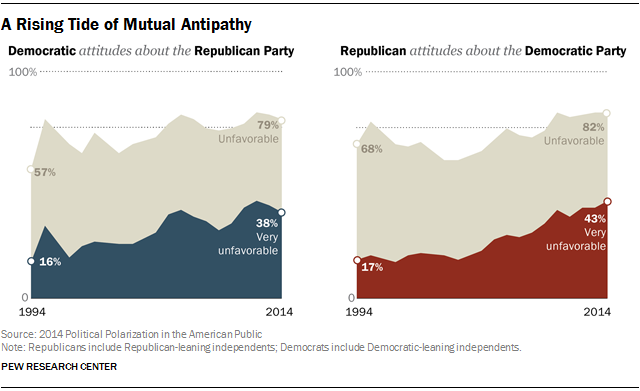Angels Move Us From Disdain to Appreciation
I learned something scary today. And something beautiful.
The scary: Political polarization in America is at its worst since just after the Civil War. The vast majority of Republicans and Democrats have unfavorable views toward the other party, and "very unfavorable" views have more than doubled since surveys started in 1994. And those attitudes are liable to harden since almost two-thirds of conservatives and about half of liberals report that most of their close friends share their political views.
But there is hope.
Recognizing that we need each other's perspectives to create a more perfect union, there's a determined and growing group of courageous people working to build bridges across the divide. They're called Braver Angels, and they've been creating harmony with reds and blues since 2016. Inspired by Abraham Lincoln's appeal to summon the "better angels" of our nature and to go forward "with malice toward none, with charity for all, with firmness in the right,” they are working relentlessly to move the tone of our political discourse from hatred and disdain to respect and appreciation.
 |
| What De-polarization Looks Like (by Braver Angels) |
Here's the beautiful: what they're doing works. It is possible to have meaningful conversations across our differences. To disagree in a way that strengthens our friendships and our country. We just have to learn how.
I started learning how today, when I did the first part of their training on Bridging the Divide. It taught me some strategies for navigating discussions that feel like minefields. And then I practiced with a friend whose political views tend to be expressed loudly and abrasively and to get more and more extreme the longer he talks and the more I try to help him see reason.
Our conversation today was not a dialogue. That wasn't my goal. I just wanted to practice the skills of reflective listening in preparation for a workshop I'll be taking tomorrow.
But here's what happened. He said something about having the right to shoot any Black Lives Matter protestors that might invade his home. I wanted to challenge his assumption that protestors would try to invade his home, or to ask whether he thought lethal force was necessary as a first resort. But the skill I needed to practice was reflective listening, so I said, "You feel like you should have the right to defend your home and your property." He agreed and continued along similar lines. I paraphrased the fundamental issue or sometimes the emotional content of what he was saying. He became less and less angry in his expressions. Finally, as our "conversation" wounded down, he said he felt understood.
My friend has some disabilities that make it extremely difficult for him to engage in dialogue or to see things from someone else's point of view. So I didn't even try to share my perspective with him. That would have been too much for one day.
What was beautiful was that, even without me trying to share my perspective, he moderated himself. I didn't have to agree with him. I only had to focus my attention on the legitimate part of his expressions and reflect that back so that he knew that he was heard.
Just listening was depolarizing. Tomorrow, I'll get to practice dialogue.
Check out Braver Angels. Like me, you might find some tools for growing wings.





Comments
Post a Comment